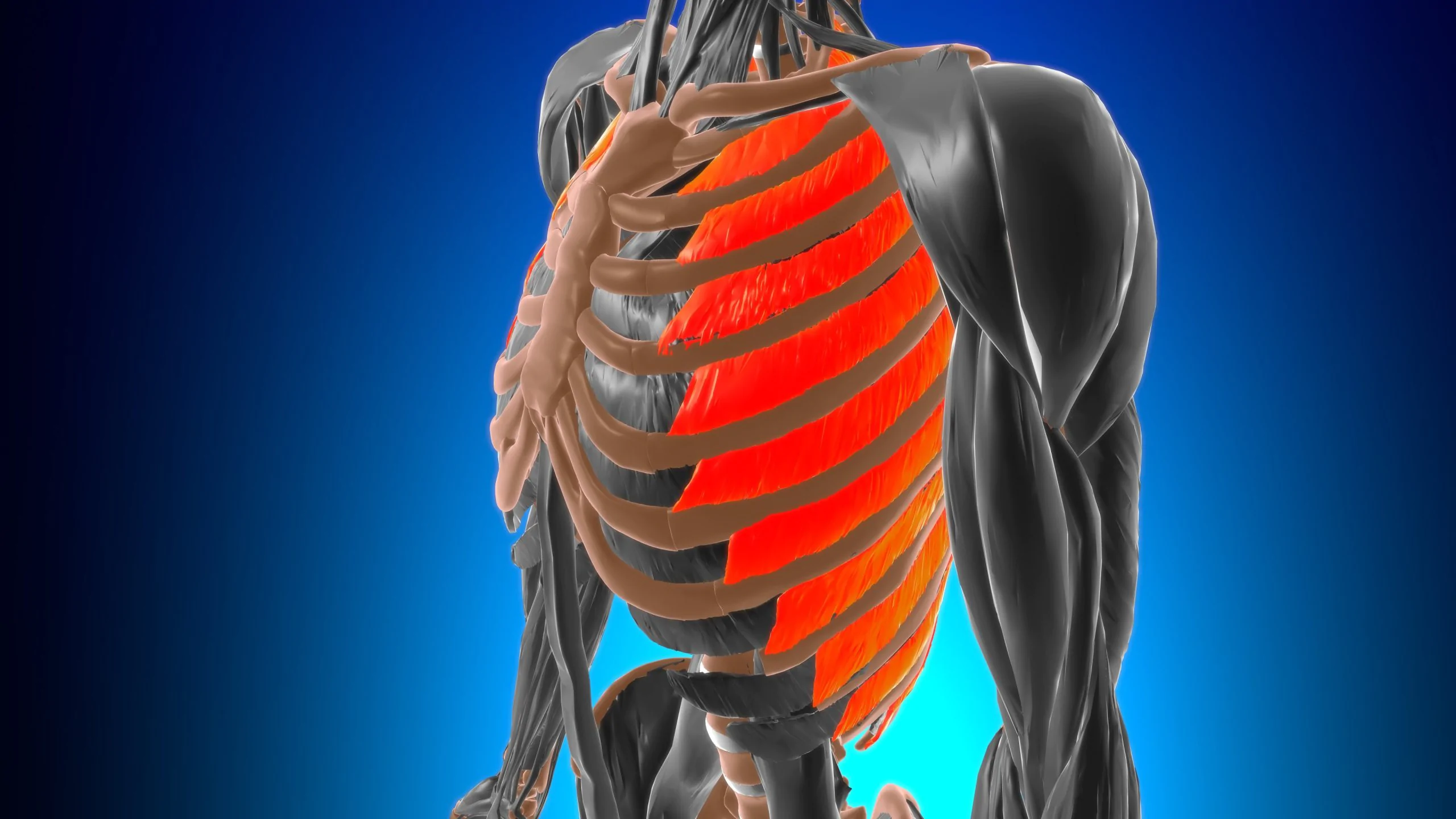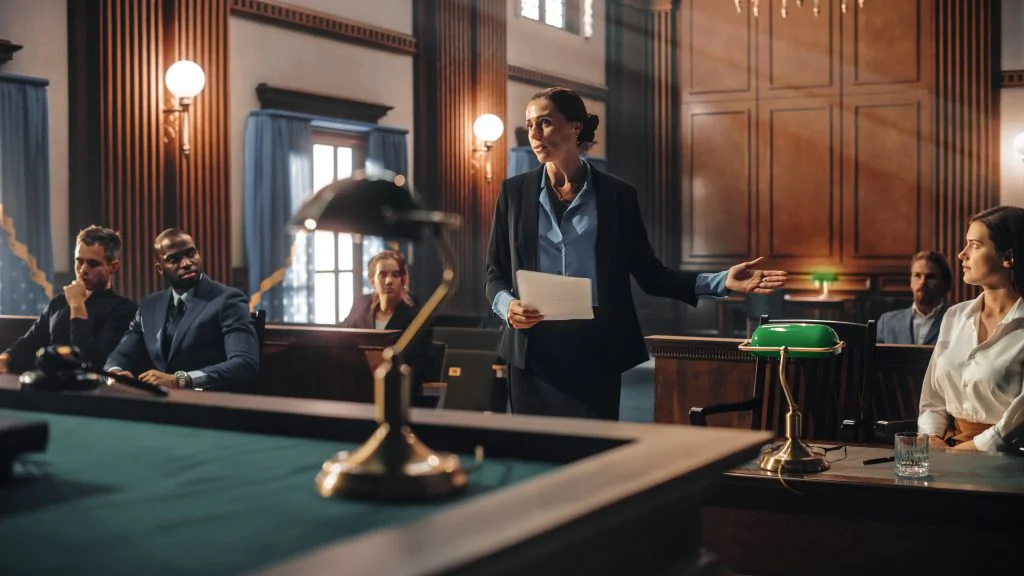The intercostal muscles are 11 sets of muscles on either side of the rib cage. Each set of intercostal muscles is located between the upper back and mid-back in the ribs. Put simply, they’re the muscles that line the rib cage and help to protect the chest cavity and vital organs like the lungs and heart. They cannot be individually controlled.
Read on to learn more about intercostal muscle injuries including their symptoms, recovery times, common causes, and legal options for victims who sustained rib injuries due to negligence.
Intercostal Muscle Strains Explained
An intercostal muscle strain is any strain, twist, or stretch that causes the muscle fibers to tear or become damaged in some notable way. They can be caused by a number of factors, and certain individuals may be more at risk for these types of strains than others.
Intercostal muscle strains are relatively common, with between 21% and 49% of all reported chest pains coming from the intercostal muscles being twisted, torn, or otherwise damaged.
Although these muscles are generally immobile (only usually moving during inhalation or exhalation), they can occasionally become strained due to intense physical activity, auto accidents, and other hazardous events or activities. In some cases, intercostal muscle strains can be painful enough or disruptive enough to require surgery or medical intervention. Such cases could be grounds for a personal injury lawsuit.
How to Tell if You Have an Intercostal Muscle Strain
It’s usually easy to tell if one has an intercostal muscle strain. The most common signs and symptoms of these strains include:
- Sharp and distinctive pain in the upper back or ribs
- A severe or sudden sting of pain that accompanies a blow to the back or chest
- A gradual worsening of pain after repetitive physical movements like swimming, rowing, lifting, or other physical exercises that may use these muscles
- Worsening pain when breathing, sneezing, or coughing
- Rigid muscles or stiffness when bending, twisting or moving the upper body
- General tenderness in the ribs or in between individual ribs
- Intercostal muscle spasms
In some cases, it may be difficult to determine whether one has an intercostal muscle strain or some other type of upper body pain.
Generally, intercostal muscle strains are due to a specific event, like overextension, a physical blow to the chest, or other factors. Other types of long-term or chronic upper body pain may be due to other conditions.
What to Do if You Receive an Intercostal Muscle Strain
Individuals who believe they may have suffered an intercostal muscle strain don’t always need to see a doctor or visit a clinic. In many cases, placing an ice pack or warm pack on the affected muscles may soothe the area and alleviate pain while the tissue repairs itself.
However, intercostal muscle strains with pain that persists for several days or weeks may be more serious or indicative of a larger problem. Victims should see doctors if their pain is severe or if it interferes with daily activities, like mobility, or sleeping.
Of course, individuals who experience an auto accident or any other incident in which they receive injuries should visit a doctor to get their health checked no matter what.
If the intercostal muscle strain(s) in question was due to the negligent actions of another person, the victim may be able to file a personal injury lawsuit.
Common Causes of Intercostal Muscle Strains
Due to their location in the upper back and chest, intercostal muscles are usually immobile and do not frequently become injured. However, the intercostal muscles can be damaged and receive strains from a number of common causes like:
- Direct blows to the rib cage, which can occur during car accidents, falls, or physical assaults
- Improper motion or activity when lifting weights, such as twisting when bending up or down
- Impact blows from contact sports like football, hockey, or rugby
- Twisting one’s torso beyond how it is normally supposed to move. This can occur during stretching, yoga, or by accident
- Reaching overhead when lifting heavy objects or performing other tasks, like painting a ceiling
- Reaching overhead for a prolonged period of time, even if the victim is not carrying anything heavy
- Repetitive movements that do affect the intercostal muscles, such as hitting a baseball or hitting a tennis ball
As with many types of muscle strains, intercostal muscle strains could be more common among individuals who do not exercise these muscles frequently.
Intercostal Muscle Strains Caused by Negligence
Due to the myriad causes of intercostal muscle strains, most of them are not caused directly by another person or party.
But if an intercostal muscle strain – and any related damage – is due to the actions of another party, they may also be due to negligence. If this occurs, victims may be able to file for a personal injury lawsuit by proving negligence in a court.
Some examples of intercostal muscles caused by negligence include:
- A person hitting a victim in the chest, either with a hand or a weapon, which causes an intercostal muscle strain and related damage
- An auto accident in which the at-fault driver causes the injuries sustained by the victim, including intercostal muscle strains
- A workplace requires workers to lift heavy objects without appropriate equipment or training, leading to a muscle strain and potentially other injuries
These are just a few examples of cases in which victims may have grounds for a lawsuit. A successful personal injury or worker’s compensation lawsuit could lead to damages for:
- The pain and suffering of the intercostal muscle strain and other injuries
- The cost for any medical expenses that may have been incurred
- Coverage for any work that had to be missed by the victim
Contact Intercostal Muscle Strain Lawyers
Ultimately, victims of intercostal muscle strains don’t need to wait if they believe that their injuries were caused by another person or some other type of negligence. Contact Sobo & Sobo today for more information about personal injury lawsuits, potential compensation amounts, and a free consultation.




